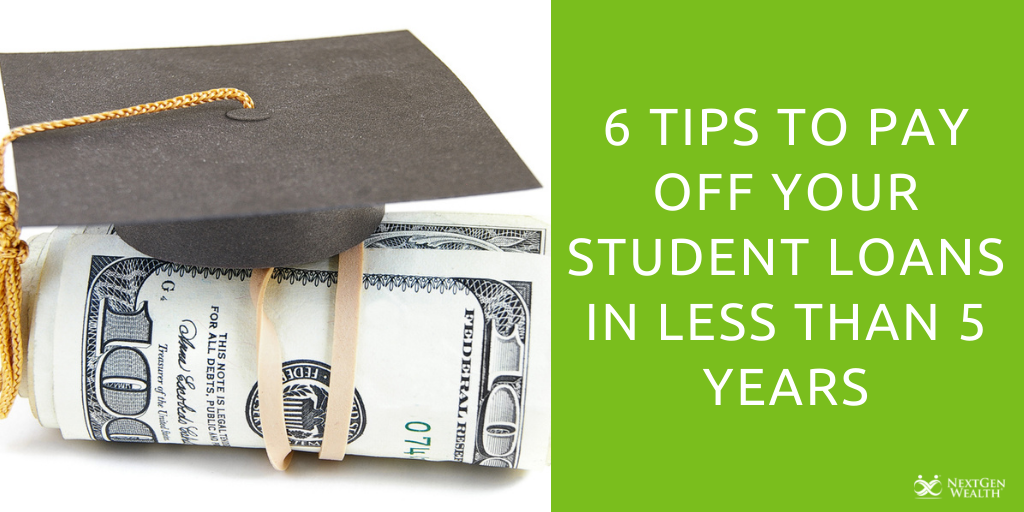6 Tips to Pay Off Your Student Loans in Less than 5 Years
Student loan debt in the United States is over one trillion dollars and growing. Millions of people are carrying the burden of student loans. Many still can’t see the light at the end of the tunnel when it comes to paying them off. 
Paying off your student loans can be difficult. With high interest rates and different rules than other types of loans, student loans are a tricky business. For those that want to be done with them at last, we have some great tips for paying off your student loans in less than five years.
Make A Budget
Your first step in paying off any debt is to make a budget. Having a budget will help you assess your spending habits and finances. By using a budget, you will be able to see what money you can move around in order to help you achieve your goals.
How to Make A Budget
To create a budget, you need to keep track of all spending and income for a month or two. The simplest way to budget is to make sure you are earning more than you’re spending. However, it can be hard to cut down when you don’t know what you’re spending your money on.
Many budgeting experts recommend dividing your spending into categories such as housing, food, utilities, clothing and entertainment. A popular method is to use these categories as percentages of your income. Ideally, you want each category to only take up a certain percentage of your income or less.
Using this method or whatever method you feel most comfortable with, you can determine if there’s anything you can spare. Perhaps you could reduce debt in other places and minimize spending anywhere you can. You can then allocate that money to your student loan payments.
Pay as Much as Possible
This tip may seem obvious, but many people stick to the minimum payment due every month. If you want to pay down your debt, especially high interest student loans, you need to pay as much as possible.
The longer you’re paying on your loans, the more interest you will have to pay on top of the principal balance. It might mean cutting into savings for other things, but paying off your debt sooner will give you a lot more money to work with in the long run.
One way to pay as much as possible is to use extra, irregular income. If you get a gift or inheritance from someone, for example, consider using that money to pay toward your debt.
Make sure there are no penalties for overpayment or paying your loan off early. Also, ensure any extra money you send in is applied to that month’s payment rather than next month’s. This way your payment schedule won’t be disturbed.
To determine how fast you can pay your student loan down, or any other factors such as a different loan term or interest rate, use a student loan calculator. For example, if you are able to pay an additional $100 a month on your student loans, you can see how long it will take to pay off your loan.
Refinance
If you have student loans with high interest rates, multiple loans at once or think it may be possible to get a better rate, consider refinancing. Refinancing will combine your loans under one private lender, essentially paying off multiple loans with one big loan.
Refinancing may not be a good option for everyone. Your credit score, current occupation and income may affect your potential interest rates and other loan terms, or your eligibility for refinancing.
Many lenders offer free estimates for refinancing, though your actual application may have different results due to the hard credit check versus no check or a soft credit check associated with an estimate.
Reduce Your Expenses
It’s not always possible to cut down on every expense, nor should you make yourself miserable trying to cut out every possible expense in favor of your debt. If you haven’t tried cutting your expenses yet or are looking for more ideas, here are a few tips that might help you put some extra money toward your student loans:
Get a roommate or roommates to offset housing expenses
Depending on where you live, you might be paying a lot for housing, rent or otherwise. If you have the space, having a friend live with you and split the housing and utilities payments can cut down one or two of your biggest and least flexible expenses. The more roommates you have, the lower your percentage of the bills.
Cut down on clothing costs
If you find yourself buying new clothes frequently, take time to examine why. If you just like shopping for clothes, consider buying second hand or teaching yourself to window shop only instead.
If your clothes keep wearing out, learning to sew and repair your clothing is a great way to save money and the environment. Having a smaller number of more durable, less trendy clothes can practically eliminate your clothing costs.
Budget your food expenses
Again, depending on where you live, you may be paying quite a bit for your food. Taking stock of how you’re spending on food can help identify ways to reduce that expense. For example, eating out may actually be cheaper than making your own food in some places, and depending on what you’re eating.
Reduce recurring expenses
There are a lot of services that can quietly eat up your income every month. Things like gym memberships, streaming services and telecom bills can seem like a small monthly rate but add up quickly. See if you can cut out any of these subscriptions or switch to a cheaper alternative so you have some extra cash for your debt every month.
Downsize
If you are willing to make some bigger changes, consider downsizing. Reduce your car, housing, utility or other major expenses by moving or switching to something with a lower cost. For example, if you’re living in a place with higher expenses such as HOA dues or expensive infrastructure, you might be able to save a lot of money by moving to a more rural area or smaller home.
Work from home
Options for working from home are a lot more abundant these days. Working from home can save you from spending on commuting expenses, work wardrobe, eating out for lunch and more. Consider working from home if you already have the option, or switching to a job that allows you to work from home.
Boost Your Income
Low wages are a problem for many people, especially when you’re dealing with student debt. While the simplest solution is to get a higher paying job, this isn’t always possible. If you have extra time, consider using it to make extra money.
Odd jobs, part time jobs, delivery apps, online gigs and selling things online are all possible ways to get some extra income on top of your existing occupation. If you don’t have time but you’re living somewhere with a high cost of living, you could consider moving and either keeping your current job, especially if it’s online, or getting a higher paying one.
If you can increase your income to expense ratio by moving somewhere cheaper, all the better for having money to pay off your debt.
Look into Student Loan Forgiveness Programs
Many careers, especially in state or federal government, offer programs to help you pay off your student loans. Consider checking with your current employer to see if they already have a program you could be taking advantage of.
If not and you’re willing to change jobs, consider looking for jobs that offer loan forgiveness programs. The Public Service Loan Forgiveness program is a great option if you’re looking to get a career within the government. That doesn’t just mean politics, either.
Government jobs that qualify you for loan forgiveness can be anything full time, from office work and customer service to law enforcement and science careers. Certain careers with non-governmental organizations can also qualify for this program.
Conclusion
Student loan debt can be hard to deal with, especially when your loans have high interest rates. Many people are also struggling with low wages and lack of sufficient employment. With so many people carrying the burden of student loans, it can seem impossible to break free.
However, don’t lose hope. There are a lot of different avenues toward paying off your debt, even in just a few years. Every little bit helps, so with these tips you could be on the road to financial freedom sooner than you might expect.
At NextGen Wealth, we specialize in helping you plan and reach your money goals. With a Certified Financial PlannerⓇ on your side, you can rest easy knowing you’re getting the right advice and assistance with your financial situation. Whether you need help with budgeting, paying off debt or saving for retirement, we can help.
Contact us today to get a free Financial Assessment.

